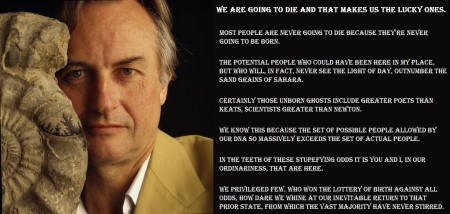Last day of class in FoL, soon the Future class will be past. Time keeps on slipping slipping slipping… So we’d better finish Generosity.
Thassa channels Richard Dawkins: “we are the lucky ones,” he said.
And she says
Everyone alive should feel richly content, ridiculously ahead of the game, a million times luckier than the unborn
And
No one should be anything but dead.
And
Everything that is, is ours.
She’s right, but like the rest of us she’ll have a hard time holding those thoughts and holding off intermittent existential despair. Maybe none of us has alleles long enough to sustain our most elevated moments of transcendent insight. Alas. But maybe, too, their very transience and instability is what makes those moments so special.
Older Daughter recently amazed me by participating in NaNoWriMo, “national novel-writing month,” a public writing project in which participants pounded out 50,000 words in thirty days. I was so impressed with her determination and stamina. I’d have felt more like Russell Stone, or a weak-willed Sisyphus, if you’d made me do that: “I have to go take my own life.”
But of course I, like Stone, believe that all writing is re-rewriting. In the past that’s always slowed us down. If we’re re-writing not just words but genetic code, it may speed us up. Strap on your seat-belts.
As a pragmatist I feel somewhat dissed by Powers’ characterization of the “witty pragmatism” of the positive psychologist who tells “Oona’s” audience– much like Oprah’s– about happiness. He might be right, though, to advise keeping your options open (“stay loose and keep revising the plan”). Is Powers right to predict that pop media culture will be the largest stage upon which our collective future is to be written? Scary thought. But “all the world’s a stage” is scary, too.
Kurton prefers collaborative fiction to singly-authored texts. We’ve talked about that, in connection with the Updike-Kelly dispute. I’m still in Updike’s (not Kurton’s or Kelly’s) corner.
More Dawkins-esque rhapsodizing about our evolutionary epic:
Six hundred generations ago, we were scratching on the walls of caves. Now we’re sequencing genomes… If that doesn’t inspire us, we don’t deserve to survive ourselves.
That’s a bit harsh, but I’m inspired. I’m also partial to my old-fashioned founts of happiness. Can’t we have both?
Finally, in this oddly self-referential tale that ends in narrative dissolution, Powers asks “What kind of story would ever end with us?” On Eaarth? You’ll have to answer that for yourself, but my answer is: the story we’re living at this very moment continues with us. Where it all ends is a mystery.
So we’d better be generous, and give all we’ve got right now. The future will be here before we know it. Cue the symphony.

